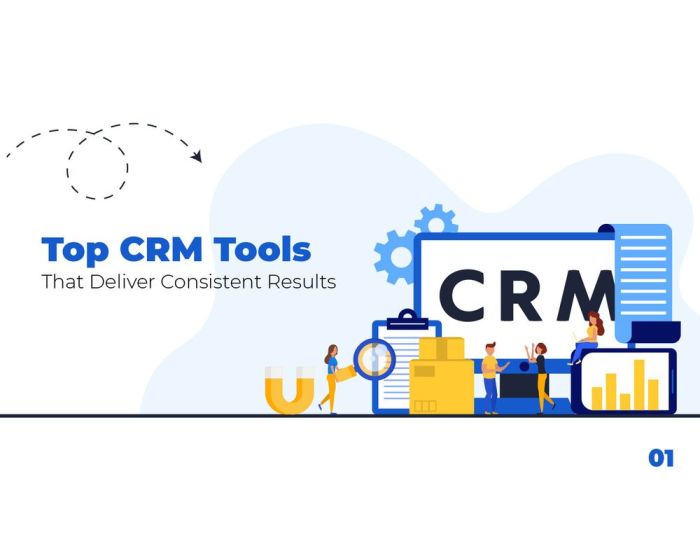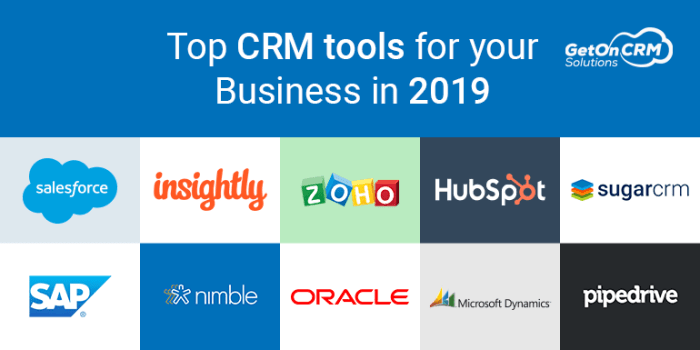Using CRM Tools in Marketing sets the stage for this enthralling narrative, offering readers a glimpse into a story that is rich in detail with american high school hip style and brimming with originality from the outset.
CRM tools have revolutionized the way businesses interact with customers and execute marketing strategies. From enhancing customer relationships to optimizing marketing campaigns, these tools play a crucial role in the success of modern marketing efforts. Let’s dive deep into the world of CRM tools in marketing and uncover the key strategies and benefits they offer.
Importance of CRM Tools in Marketing
CRM tools play a vital role in enhancing customer relationships and improving marketing strategies. These tools help businesses better understand their customers, personalize interactions, and ultimately drive sales.
Enhancing Customer Relationships
Using CRM tools allows businesses to track customer interactions, preferences, and purchase history. This data can be utilized to tailor marketing messages and offers to individual customers, increasing engagement and loyalty.
Benefits of Using CRM Tools for Marketing Campaigns
– Improved Targeting: CRM tools enable businesses to segment their customer base and target specific groups with personalized marketing campaigns.
– Enhanced Communication: With CRM tools, businesses can automate communication with customers, sending targeted messages at the right time to drive conversions.
– Data Analysis: CRM tools provide valuable insights into customer behavior and preferences, allowing businesses to make data-driven decisions to optimize marketing strategies.
Successful Marketing Strategies Using CRM Tools
– Personalized Email Campaigns: By leveraging CRM data, businesses can create personalized email campaigns that resonate with individual customers, leading to higher open and click-through rates.
– Loyalty Programs: CRM tools help businesses track customer purchases and interactions, allowing them to reward loyal customers with personalized offers and incentives.
– Cross-Selling and Upselling: CRM data can be used to identify opportunities for cross-selling and upselling to existing customers, increasing revenue and customer lifetime value.
Types of CRM Tools for Marketing: Using CRM Tools In Marketing

CRM tools come in various forms, each offering unique features to help businesses streamline their marketing efforts and improve customer relationships. Let’s explore some of the different types of CRM tools commonly used in marketing:
Email Marketing CRM Tools
Email marketing CRM tools are designed to help businesses manage their email campaigns effectively. These tools often include features such as email automation, contact segmentation, and performance tracking. Popular options like Mailchimp, HubSpot, and Constant Contact offer robust email marketing capabilities to engage with customers through personalized communication.
Social Media CRM Tools
Social media CRM tools focus on managing interactions with customers on various social media platforms. These tools allow businesses to monitor social mentions, track engagement metrics, and analyze customer sentiment. Platforms like Hootsuite, Sprout Social, and Buffer help businesses stay connected with their audience and provide timely responses to inquiries and feedback.
Analytics CRM Tools
Analytics CRM tools provide valuable insights into customer behavior, preferences, and buying patterns. These tools help businesses make data-driven decisions by analyzing customer data and performance metrics. Tools like Google Analytics, Salesforce Analytics, and Tableau offer powerful analytics capabilities to track marketing campaign effectiveness and optimize strategies for better results.
Customer Service CRM Tools
Customer service CRM tools focus on improving customer support and satisfaction. These tools help businesses manage customer inquiries, complaints, and feedback efficiently. Popular options like Zendesk, Freshdesk, and Intercom offer features such as ticket management, knowledge base, and live chat support to enhance the overall customer experience.
Mobile CRM Tools, Using CRM Tools in Marketing
Mobile CRM tools are designed to help businesses manage customer relationships on mobile devices. These tools provide on-the-go access to customer data, communication channels, and sales information. Mobile CRM apps like Zoho CRM, Salesforce Mobile, and Insightly CRM enable sales and marketing teams to stay connected with customers, regardless of their location, and respond promptly to customer needs.
Implementing CRM Tools in Marketing Strategies
Implementing CRM tools in marketing strategies is crucial for businesses looking to enhance customer relationships, streamline processes, and improve overall marketing effectiveness. By integrating CRM tools into marketing strategies, companies can better target their audience, personalize their messaging, and track customer interactions to drive sales and loyalty.
Steps involved in integrating CRM tools into marketing strategies:
- Identify marketing goals: Clearly define your marketing objectives and how CRM tools can support them.
- Choose the right CRM tool: Select a CRM tool that aligns with your business needs and budget.
- Integrate CRM with existing systems: Ensure seamless integration with other tools like email marketing platforms, social media channels, and analytics tools.
- Train your team: Provide adequate training to employees on how to use CRM tools effectively in their marketing efforts.
- Analyze and optimize: Continuously monitor and analyze data from CRM tools to optimize marketing strategies and improve results.
Tips for effectively utilizing CRM tools for targeted marketing efforts:
- Segment your audience: Use CRM tools to segment your audience based on demographics, behavior, and preferences for personalized marketing campaigns.
- Automate workflows: Leverage automation features in CRM tools to streamline marketing processes and nurture leads effectively.
- Utilize data insights: Harness data insights from CRM tools to make informed decisions and tailor marketing strategies for better results.
- Monitor customer interactions: Keep track of customer interactions across various channels to improve engagement and customer satisfaction.
Best practices for aligning CRM tools with overall marketing objectives:
- Set specific KPIs: Define key performance indicators aligned with marketing goals to measure the impact of CRM tools on business outcomes.
- Collaborate cross-functionally: Encourage collaboration between marketing, sales, and customer service teams to ensure a unified approach to customer engagement.
- Regularly update customer data: Keep customer data up-to-date in CRM tools to deliver personalized experiences and targeted marketing campaigns.
- Seek feedback: Gather feedback from customers and internal teams to continuously improve CRM strategies and enhance overall marketing effectiveness.
Leveraging Data from CRM Tools in Marketing

CRM tools play a crucial role in collecting and analyzing customer data, providing valuable insights that can be used to optimize marketing strategies. By leveraging data from CRM tools, businesses can better understand their target audience, personalize their messaging, and improve overall customer satisfaction.
Role of Data Analytics in Optimizing Marketing Campaigns with CRM Tools
Data analytics is essential in optimizing marketing campaigns with CRM tools. By using data analytics, businesses can track the effectiveness of their marketing efforts, identify trends and patterns in customer behavior, and make data-driven decisions to improve ROI. For example, analyzing customer purchase history can help businesses identify cross-selling opportunities and tailor their marketing campaigns accordingly.
Examples of Data-Driven Decision-Making in Marketing using CRM Tools
- Personalized Email Campaigns: By analyzing customer data such as purchase history, browsing behavior, and demographic information, businesses can create personalized email campaigns that resonate with their target audience, leading to higher open rates and conversions.
- Segmentation Strategies: CRM tools enable businesses to segment their customer base based on various criteria such as buying behavior, preferences, and engagement levels. This segmentation allows businesses to tailor their marketing messages to different customer segments, increasing the relevance and effectiveness of their campaigns.
- Predictive Analytics: Using predictive analytics, businesses can forecast customer behavior, such as likelihood to churn or make a repeat purchase. By leveraging this data, businesses can proactively address customer needs and preferences, leading to improved customer retention and loyalty.